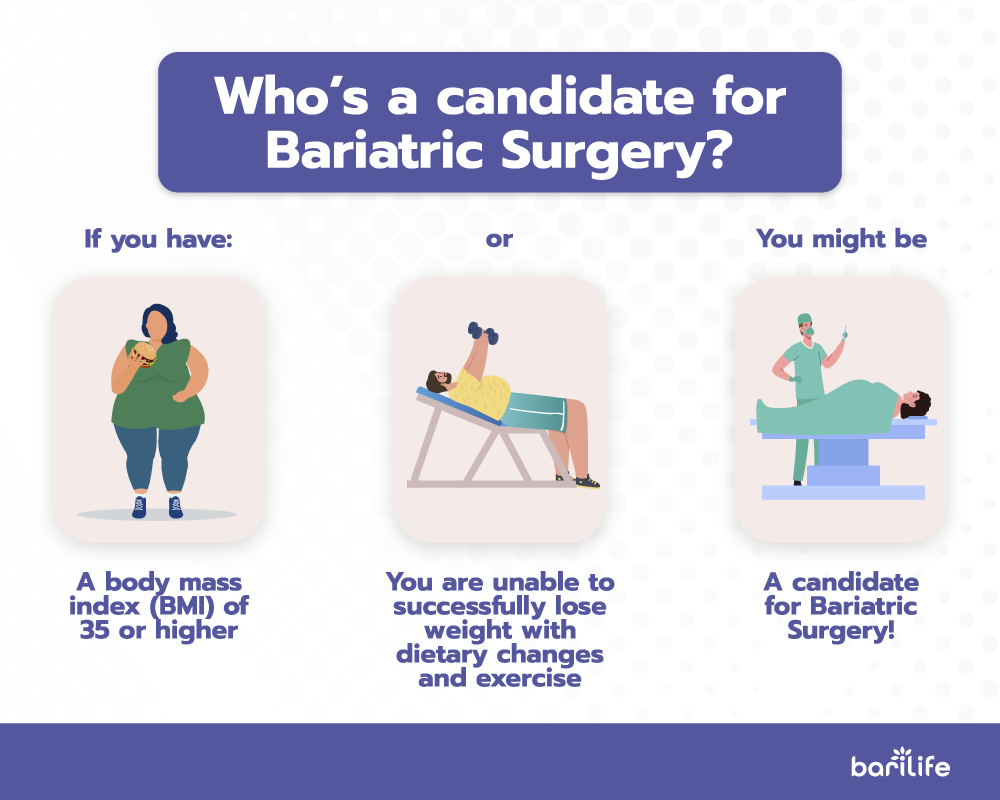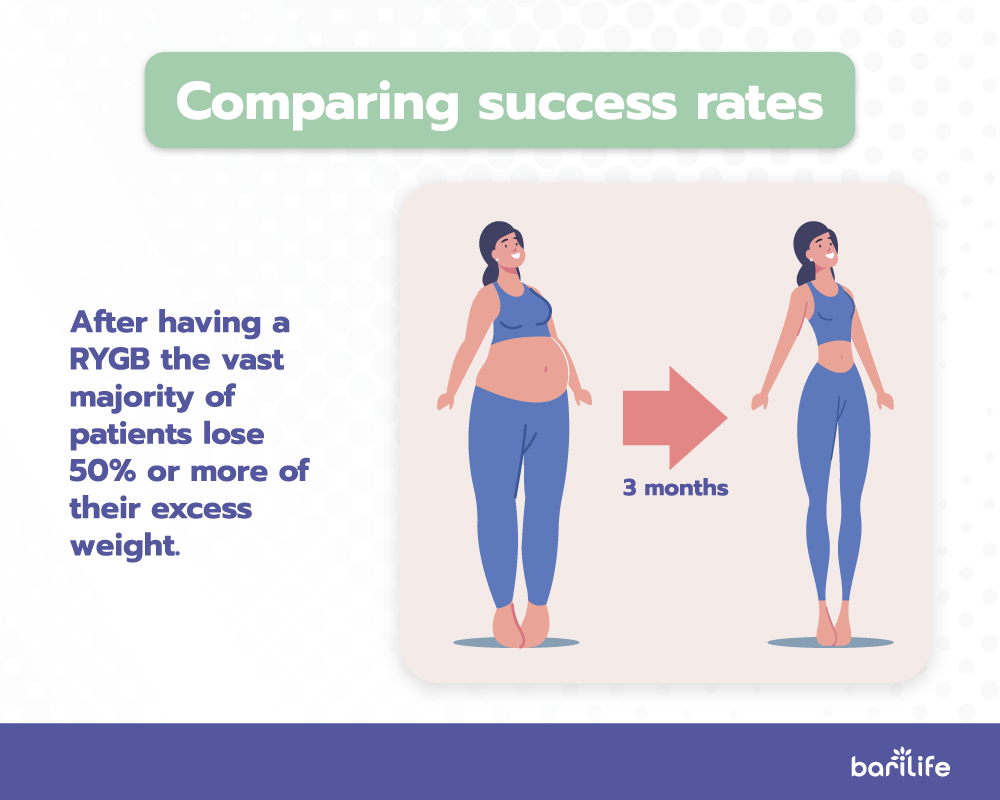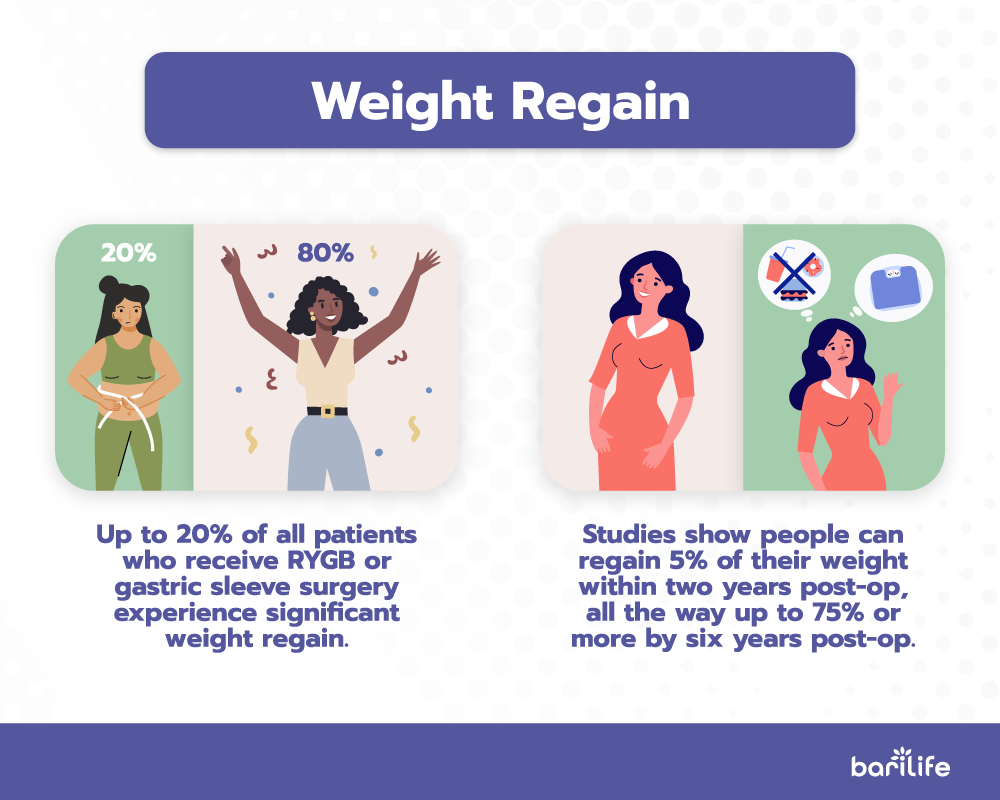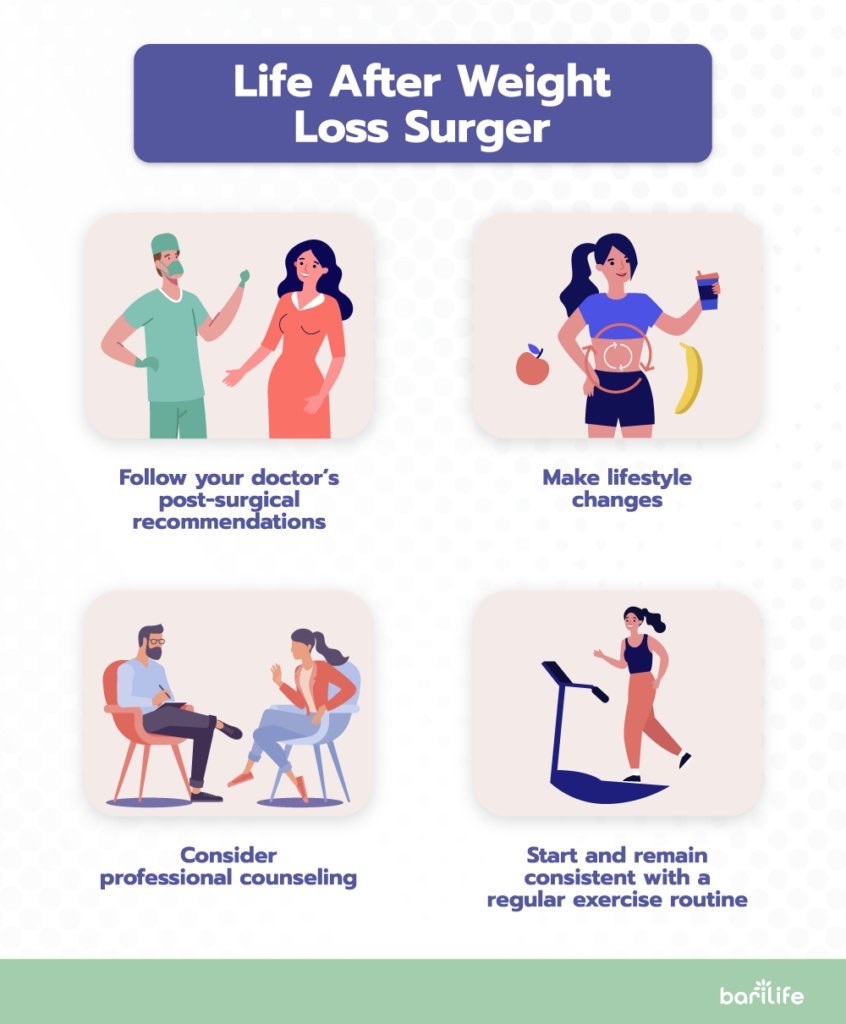Gastric sleeve and gastric bypass are two different types of bariatric surgery using different surgical procedures. Bariatric surgery, also known as weight loss surgery, is a blanket term that describes any surgery that alters the digestive tract in order to promote weight loss. These surgeries limit the amount you can comfortably eat. They also affect hunger hormones and appetite regulation.
You may be wondering which procedure is right for you, and how much weight you can lose with each. Keep reading to learn more about both gastric sleeve surgery and gastric bypass and what each procedure entails. Then use the gastric bypass weight loss calculator to compare how much weight you can expect to lose with each procedure.
Who is a candidate for bariatric surgery?
Bariatric surgery may be recommended for people with obesity who have struggled to lose weight with diet and exercise alone, including those with repeated weight regain. Bariatric surgery may also be appropriate for people who have obesity-related health conditions, such as type 2 diabetes.
Bariatric surgery is only an option for people with obesity. People who are overweight, not obese, are not good candidates for this surgery.
Weight loss surgery may be appropriate for you if:
- you have a body mass index (BMI) of 35 or higher
- you have been unable to successfully lose weight with dietary changes and exercise
Your doctor may recommend weight loss surgery particularly if you also have other obesity-related health conditions including:
- type 2 diabetes
- high blood pressure
- metabolic syndrome

Gastric bypass
Gastric bypass is a type of weight loss surgery also known as Roux-en-Y gastric bypass (RYBG). It is considered the gold standard of bariatric surgery.
Gastric bypass decreases the size of your stomach. The small intestine is then divided to separate the upper and lower parts, known as the duodenum and the jejunum. The new stomach pouch is attached to the lower portion of the small intestine, or jejunum, while the upper portion of the small intestine, or duodenum, is connected further down the small intestine.
Two new connections are made during this procedure. One from the new stomach to the lower small intestine, and another from the upper small intestine to the lower small intestine.
This alteration decreases the amount of food you can eat. It also changes the way your body absorbs nutrients, including carbohydrates. As a result of this, hormonal changes often occur that may affect your appetite.
Gastric sleeve
The sleeve gastrectomy often referred to as the gastric sleeve, is a surgical procedure that removes about 75-80% of the stomach. During the procedure, the stomach is formed into a tube-like structure, or a “sleeve,” that is roughly the size of a banana.
Much like gastric bypass surgery, altering the size of your stomach decreases the amount of food and liquid you are able to tolerate without discomfort. It also affects the way your body absorbs nutrients. Just as with RYGB, this affects the hormones that regulate your hunger and fullness.
The two main hormones that are impacted by gastric sleeve surgery and RYGB gastric bypass are:
- Ghrelin (the hunger hormone) is a hormone that sends signals to your brain telling it to eat. Its job is to stimulate appetite, increase food intake, and promote fat storage.
- Leptin does the opposite of ghrelin, signaling to your body that you are full and should stop eating. People who are obese often don’t respond normally to leptin and are unable to identify when they are full and should stop eating.
The three types of gastric sleeve incisions are open, laparoscopic, and single incision laparoscopic. The most commonly used technique is the traditional laparoscopic procedure.
Gastric Sleeve vs. Gastric Bypass: Comparing success rates
Weight loss surgery success rates change over time as more and more time passes after surgery. In the first years, success rates are extremely high, with the vast majority of patients successfully losing much of their excess body weight.
There are several indicators of a successful surgical outcome. These include percent excess weight loss (%EWL), improvement in obesity-related health conditions or comorbidities (like type 2 diabetes, hypertension, and sleep apnea), and overall weight regained over time. Let’s compare gastric sleeve and gastric bypass success rates.
Weight loss
The vast majority of RYGB patients lose 50% or more of their excess weight.
One month after having gastric bypass surgery, you can expect to lose about 17% of your excess body weight. At 3 months, patients lose on average between 25-35% of their excess body weight. Patients should lose about 45-55% by the 6-month mark.
A year after gastric bypass, if you are consistent with your diet and physical activity, you should lose around 60-70% of your excess body weight. By 18 months, some patients successfully lose 75-85% of their excess body weight.
A successful gastric bypass can be measured by percent excess weight loss of 45-55% at six months and 75-80% at 18 months. You can use a gastric bypass weight loss calculator to estimate how much weight you are expected to lose.
People receiving gastric sleeve can expect to lose about 50% of their excess weight 6 months after surgery. At one year, they may lose up to 60%, and at two years 65%. Therefore, if your gastric sleeve results are similar to these, then your surgery would be considered successful.

Improvement of obesity-related health conditions
Another indicator of successful weight loss surgery is improvement in other health conditions. Most people who received either RYGB or gastric sleeve surgery experienced improved overall health, including normalization of cholesterol levels and resolution of fatty liver disease, to complete resolution of joint pain.
A research study showed that 63% of patients found their type 2 diabetes to be completely in remission 6 months post gastric bypass surgery. Another study demonstrated significant improvement in high blood pressure in patients with 34% of patients being able to stop medication and many others lowering medication dose significantly. The same study showed similar results in people who had gastric sleeve surgery instead of gastric bypass.
Studies show that many people who undergo both gastric sleeve surgery and gastric bypass experience the same improvements in obesity-related health conditions.
Weight regain
Up to 20% of all patients who receive RYGB or gastric sleeve surgery experience significant weight regain. For both gastric bypass and gastric sleeve, studies show people can regain 5% of their weight within two years post-op, all the way up to 75% or more by six years post-op. Bariatric surgery results are dependent on a number of factors, but the good news is, you have control of many of them.
If you adhere to your surgeon’s recommendations, follow your nutrition plan, and exercise regularly, you should maintain your results.

Life after weight loss surgery
Regardless of which surgery you decide to have, your lifestyle changes after surgery will be the same. Gastric bypass or gastric sleeve, you’ll need to adhere to a specific diet with reduced portions, exercise consistently, and take bariatric multivitamins daily.
To make sure you have a successful surgery outcome:
- Follow your doctor’s post-surgical recommendations as closely as possible
- Make lifestyle changes to continually support your healthy habits and avoid triggers that will cause you to fall back into old eating patterns
- Consider professional counseling to help you navigate these changes effectively, especially if you are finding yourself binge eating, grazing throughout the day, and/or eating larger portions of food often
- Start and remain consistent with a regular exercise routine as soon as you get clearance from your surgeon

Conclusion
Both gastric bypass and gastric sleeve surgery are good options for people with obesity who have struggled to lose weight with diet and exercise alone, including those with repeated weight regain. Surgical techniques differ between these two surgeries, however outcomes are similar when you follow post-op recovery, diet, and exercise recommendations. It really boils down to which procedure you think will be best for you. Talk with your doctor to determine which surgery would be most appropriate for you.




What are your tips and tricks to post-bariatric success?